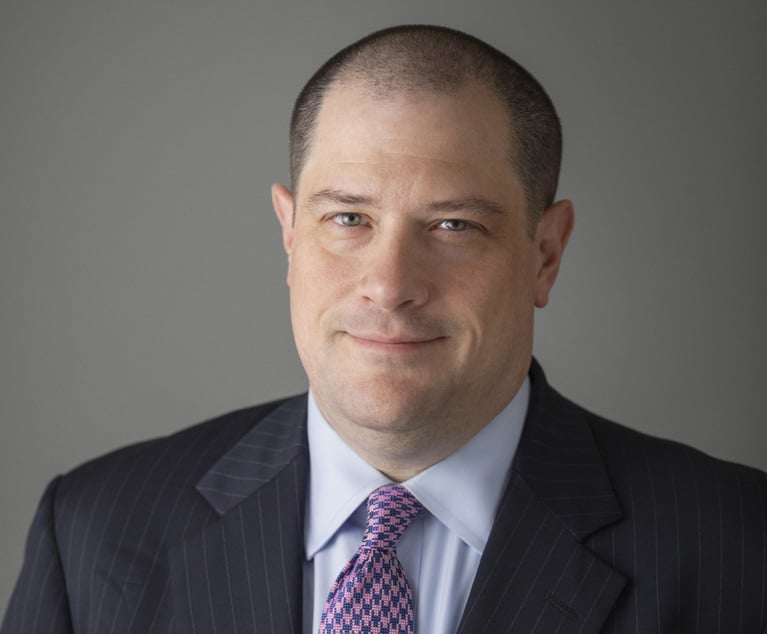 Federal Communications Commission building in Washington, D.C.
Federal Communications Commission building in Washington, D.C.Concessions by Sprint and T-Mobile Drive FCC Approval but May Not Satisfy Enforcers
Despite FCC clearance, the proposed Sprint/T-Mobile merger remains under investigation by antitrust enforcers: the Antitrust Division of the U.S. Department of Justice and several state attorneys general.
May 31, 2019 at 04:53 PM
5 minute read
On May 20, U.S. Federal Communications Commission chairman Ajit Pai and commissioners Michael O'Reilly and Brendan Carr announced that they would recommend that the FCC approve T-Mobile US Inc.'s merger with Sprint Corp., as modified. While these announcements secure FCC approval for the merger, they do not end Sprint and T-Mobile's antitrust battles.
Despite FCC clearance, the proposed Sprint/T-Mobile merger remains under investigation by antitrust enforcers: the Antitrust Division of the U.S. Department of Justice and several state attorneys general. Clearance by the FCC does not necessarily guarantee that the antitrust enforcers will follow suit. The FCC reviews transactions to determine whether they will be in the “public interest”; whereas, antitrust regulators focus solely on whether the effect of a transaction may be substantially to lessen competition. The FCC and antitrust enforcers historically have generally aligned the outcomes of their investigations, but the different standards of review mean that divergent outcomes are possible.
The FCC announcements came after Sprint and T-Mobile agreed to three major concessions to reduce concerns about their transaction's effects on consumers. First, the merging companies have promised to not increase prices to customers for three years. Second, the merging companies have committed to divest Sprint's Boost prepaid wireless business to a third party if they are allowed to merge. Finally, the merging companies have committed to developing a 5G network that would cover 97% of the nation's population within three years of consummating the merger and 99% of Americans within six years of consummation.
Sprint and T-Mobile's commitment to divest the Boost prepaid business may resolve antitrust enforcers' concerns about the prepaid wireless market if the buyer can operate Boost as a viable competitor. However, even after these concessions, antitrust enforcers may still have concerns that the proposed merger would harm competition in markets for national or local wireless services.
The parties' commitment not to raise prices to wireless customers for a period of three years post-merger does not necessarily resolve all potential antitrust concerns. First, the DOJ and state attorneys general may have concerns that Sprint and T-Mobile may defer maintenance or take other actions that could lower the quality of service, resulting in less value to consumers even if they are paying the same price per month.
Furthermore, Sprint and T-Mobile have agreed to limit their pricing power only for three years. The DOJ and state attorneys general almost certainly will evaluate the merger's effect on prices after that price freeze is lifted. Moreover, a commitment not to raise prices could be viewed by antitrust agencies as a signal that without such commitment the transaction would allow the combined entity to raise prices.
Sprint and T-Mobile likely will argue that the potential anti-competitive harm from their pricing power three years out will be offset by the benefits consumers receive from the development of the 5G network. But proving these types of consumer benefits can be a significant uphill battle. Sprint and T-Mobile will have to convince antitrust enforcers that their merger would facilitate the development of a 5G network that would not be possible “but for” the merger. Because Sprint and T-Mobile talked publicly about implementing a 5G network before announcing their merger, it may be difficult to convince antitrust regulators that a merger is necessary to build the network.
Furthermore, even if the DOJ and state attorneys general believe the merger will facilitate the parties' 5G commitments, the parties would still have to demonstrate that the potential benefits of the 5G network outweigh the possible anti-competitive effects of the transaction. Antitrust enforcers may reach a different conclusion to this balancing question in a nationwide wireless market than in more localized markets. Sprint and T-Mobile's concession to develop a 5G network covering 99% of Americans in six years would only include 90% of rural Americans. The DOJ or state attorneys general may be persuaded that the benefits of the 5G network will outweigh the potential anti-competitive effects in most geographic markets, but they may still have concerns about certain local markets.
The concessions promised by Sprint and T-Mobile are significant and go a long way toward persuading antitrust enforcers to allow their proposed merger to proceed. These concessions, however, may still leave room for concerns about anti-competitive harm and do not mean that the deal necessarily will cross the finish line without challenge or additional concessions.
Amanda Wait and Gerald Stein are part of Norton Rose Fulbright's 150-lawyer global antitrust practice, respectively in Washington, D.C., and New York. Both are former attorneys in the Bureau of Competition at the Federal Trade Commission.
This content has been archived. It is available through our partners, LexisNexis® and Bloomberg Law.
To view this content, please continue to their sites.
Not a Lexis Subscriber?
Subscribe Now
Not a Bloomberg Law Subscriber?
Subscribe Now
NOT FOR REPRINT
© 2024 ALM Global, LLC, All Rights Reserved. Request academic re-use from www.copyright.com. All other uses, submit a request to [email protected]. For more information visit Asset & Logo Licensing.
You Might Like
View All
Protecting Attorney-Client Privilege in the Modern Age of Communications
6 minute read

Lingering Questions at Supreme Court About Climate Change Litigation Need Resolution
6 minute read
Trending Stories
- 1The Impact of Erlinger on Predicate Felony Sentencing Statutes
- 2To Ease Partner Pay Tensions, Some Law Firms Are Seeking 'Middle Ground' in Transparency
- 3How Legal Aid and Tech Collaboration Can Bridge the Justice Gap
- 4The Rise of AI-Generated Deepfakes: A New Cybersecurity Threat for Law Firms
- 5Litigation Leaders: Labaton’s Eric Belfi on Running Case Investigation, Analysis and Evaluation In-House
Who Got The Work
Michael G. Bongiorno, Andrew Scott Dulberg and Elizabeth E. Driscoll from Wilmer Cutler Pickering Hale and Dorr have stepped in to represent Symbotic Inc., an A.I.-enabled technology platform that focuses on increasing supply chain efficiency, and other defendants in a pending shareholder derivative lawsuit. The case, filed Oct. 2 in Massachusetts District Court by the Brown Law Firm on behalf of Stephen Austen, accuses certain officers and directors of misleading investors in regard to Symbotic's potential for margin growth by failing to disclose that the company was not equipped to timely deploy its systems or manage expenses through project delays. The case, assigned to U.S. District Judge Nathaniel M. Gorton, is 1:24-cv-12522, Austen v. Cohen et al.
Who Got The Work
Edmund Polubinski and Marie Killmond of Davis Polk & Wardwell have entered appearances for data platform software development company MongoDB and other defendants in a pending shareholder derivative lawsuit. The action, filed Oct. 7 in New York Southern District Court by the Brown Law Firm, accuses the company's directors and/or officers of falsely expressing confidence in the company’s restructuring of its sales incentive plan and downplaying the severity of decreases in its upfront commitments. The case is 1:24-cv-07594, Roy v. Ittycheria et al.
Who Got The Work
Amy O. Bruchs and Kurt F. Ellison of Michael Best & Friedrich have entered appearances for Epic Systems Corp. in a pending employment discrimination lawsuit. The suit was filed Sept. 7 in Wisconsin Western District Court by Levine Eisberner LLC and Siri & Glimstad on behalf of a project manager who claims that he was wrongfully terminated after applying for a religious exemption to the defendant's COVID-19 vaccine mandate. The case, assigned to U.S. Magistrate Judge Anita Marie Boor, is 3:24-cv-00630, Secker, Nathan v. Epic Systems Corporation.
Who Got The Work
David X. Sullivan, Thomas J. Finn and Gregory A. Hall from McCarter & English have entered appearances for Sunrun Installation Services in a pending civil rights lawsuit. The complaint was filed Sept. 4 in Connecticut District Court by attorney Robert M. Berke on behalf of former employee George Edward Steins, who was arrested and charged with employing an unregistered home improvement salesperson. The complaint alleges that had Sunrun informed the Connecticut Department of Consumer Protection that the plaintiff's employment had ended in 2017 and that he no longer held Sunrun's home improvement contractor license, he would not have been hit with charges, which were dismissed in May 2024. The case, assigned to U.S. District Judge Jeffrey A. Meyer, is 3:24-cv-01423, Steins v. Sunrun, Inc. et al.
Who Got The Work
Greenberg Traurig shareholder Joshua L. Raskin has entered an appearance for boohoo.com UK Ltd. in a pending patent infringement lawsuit. The suit, filed Sept. 3 in Texas Eastern District Court by Rozier Hardt McDonough on behalf of Alto Dynamics, asserts five patents related to an online shopping platform. The case, assigned to U.S. District Judge Rodney Gilstrap, is 2:24-cv-00719, Alto Dynamics, LLC v. boohoo.com UK Limited.
Featured Firms
Law Offices of Gary Martin Hays & Associates, P.C.
(470) 294-1674
Law Offices of Mark E. Salomone
(857) 444-6468
Smith & Hassler
(713) 739-1250









